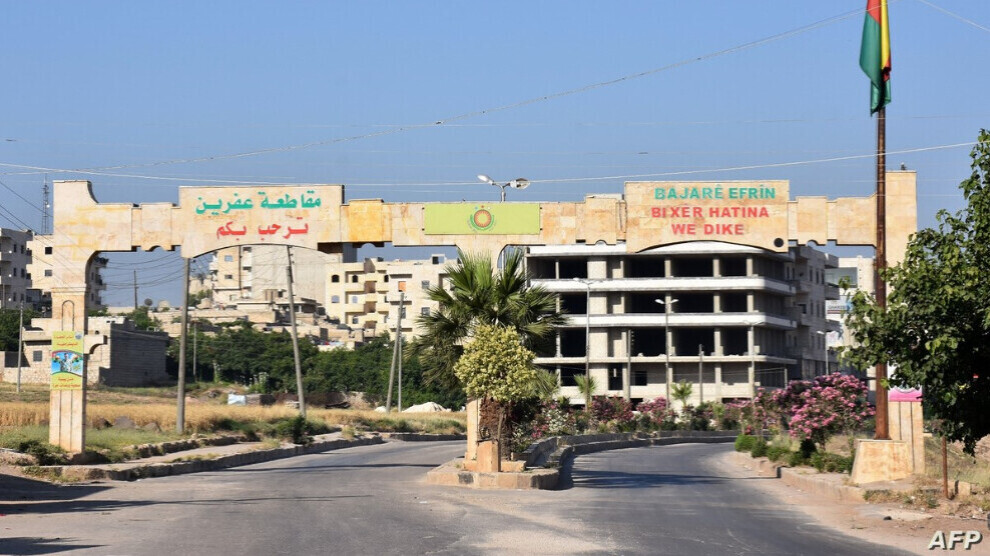Balance sheet of crimes committed in Afrin in September
The Turkish army and allied mercenaries continue committing crimes in the canton of Afrin, which they occupied in 2018 in violation of international law.
The Turkish army and allied mercenaries continue committing crimes in the canton of Afrin, which they occupied in 2018 in violation of international law.

The Human Rights Organization Afrin-Syria released the balance sheet of crimes committed by the Turkish state forces and affiliated mercenaries in occupied Afrin during the month of September.
According to the organization, 59 civilians, including 6 women, were kidnapped in the city last month, while a woman by the name of Heyat Mihemed, from the village of Gubeka in Mabata district, was killed.
The organization reported that occupation forces continue committing crimes against the residents of the city, where 135 cases of suicide were recorded in September. Threats to life and security issues were cited as the main causes of suicides, as well as the physical and psychological harassment by the occupiers.
On the other hand, colonial settlements are being built in Afrin with support from the so-called charity organizations Helping Hand For Relief and Development-HHRD and Swasia Charity Foundation, both of which are based in the U.S.
Both organizations are reported to be playing a role in the construction of colonial residential complexes near the village of Kafr Rum in the Shera district and the Helping Hand settlement near the city center of Afrin. In addition, the International Relief and Development organization is reported to be building 100 houses on a farm in the village of Kubala in the Sherawa district.
As the olive harvest season approaches, the occupied Afrin canton is witnessing an increasing rate of extortion and blackmail by the occupation forces against residents who are forced to pay a dollar for each olive tree. Those refusing to do so either have their trees cut down or their crops usurped.
The Human Rights Organization Afrin - Syria reported that the Turkish state and its mercenaries cut down a hundred olive trees and forest trees and burned dozens of hectares of forests in the districts of Mabata, Jindires, Rajo and Bilbile during the past month.
Background
Afrin Canton was the westernmost canton of Rojava and North and East Syria, home to 200,000 ethnic Kurds. Though the population was overwhelmingly Kurdish, it was home to diverse religious groups including Yazidis, Alawites and Christians alongside Sunni Muslims.
On 20 January 2018, Turkey launched air strikes on 100 locations in Afrin, as the onset of an invasion they dubbed ‘Operation Olive Branch.’
The Turkish Airforce indiscriminately shelled civilians as well as YPG/YPJ positions, while a ground assault was carried out by factions and militias organised under the umbrella of the Turkish-backed National Army.
By 15 March, Turkish-backed militias had encircled Afrin city and placed it under artillery bombardment. A Turkish airstrike struck the city’s only functioning hospital, killing 16 civilians.
Civilians fled and the SDF retreated, and by 18 March Turkey was in de facto occupation of Afrin. Between 400 and 500 civilians died in the invasion, overwhelmingly as a result of Turkish bombing. Other civilians were summarily executed in the field.
Prior to the Turkish invasion, Afrin had been one of the most peaceful and secure parts of Syria, virtually never seeing combat during the civil war but occasional skirmishes between YPG/YPJ and jihadi forces on its borders. As a result, Afrin offered peaceful sanctuary to over 300,000 internally displaced people from elsewhere in Syria.
Before the Turkish invasion, the population of Afrin consisted of well over 90 percent Kurds. According to various sources, this percentage has dropped to 15-22 percent due to the occupation. The 300,000 internally displaced persons from Afrin confirm these numbers. At the same time, more than 450,000 people were resettled in Afrin, mainly members of mercenary groups and their families, as well as refugees from other parts of Syria with links with Turkey. The Barzani Foundation and the Barzani party KDP-ENKS play an important role in Turkey's expansionist moves. Since the beginning of the Rojava revolution, the KDP and the ENKS have been trying to destabilize the region through terrorist attacks, support for Islamist mercenaries and smear campaigns against the Autonomous Administration of Rojava and to pave the way for a Turkish occupation. The occupation of Afrin has led to a regime of terror.
At the same time, the Kurdish language was banned and Turkish flags and pictures of President Erdoğan were hung everywhere. Turkish ID cards were issued. Place names were Turkified. For example, Azadî Square was renamed Atatürk Square. In addition, sacred Yazidi sites were looted and destroyed.
Around 9,000 people have been abducted in recent years, and around a third of them are still missing. These atrocious acts were committed by Hayat Tahrir al-Sham, an al-Qaeda affiliate, as well as remnants of ISIS and Turkish right-wing extremists. In the last six months alone, 12 people have been killed by the occupiers and 173 people have been kidnapped.